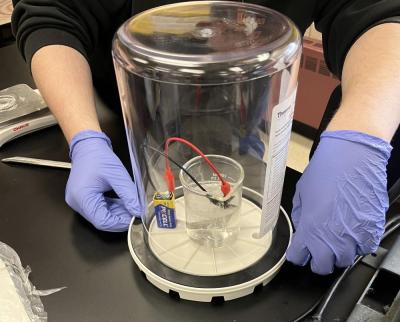Upwards and onwards: Old Colony engineering club wins NASA TechRise Competition
ROCHESTER — Old Colony Regional Vocational Technical High School’s engineering club won the NASA TechRise Competition and now they’re looking to potentially change the state of the world with their research.
Out of 720 schools, Old Colony was selected among 60 winners to apply their research proposal to an official NASA experiment.
The concept, concocted by sophomore and Rochester resident Tyler Moskos, focuses on electrolysis — the process of using electricity to separate water into hydrogen and oxygen gasses.
The goal is to produce as much oxygen as possible from the process of electrolysis, according to junior and Lakeville resident William Kane.
“[Our experiment] benefits NASA’s goals of artificial atmosphere and space colonization but it also can benefit billions of people on Earth,” said Kane. “We can use it to diffuse pollution [in] industrialized cities where air quality is very poor. We can at least contain the situation.”
Winning teams received $1500 to build their experiment in addition to receiving mentorship from NASA engineers.
This summer, the engineering club will test their research using a high-altitude balloon that will reach Earth’s upper atmosphere at a height of 70,000 feet.
Old Colony science instructor and head of the engineering club Patrick Parks says there is little public research done about the process of electrolysis in these specific conditions.
“Electrolysis is an old thing that’s thousands of years old, but how many times has it been done in a low pressure atmosphere?” said Parks. “I’m sure it has but the experiments where that’s actually been completed are behind lots of deep research papers that [the team] don’t have access to.”
Parks emphasized that the competition allows students to develop skills and practices that expand beyond what is taught in the classroom.
“I want them to take away that they can be curious and there’s a process for being curious. There’s a way to be curious,” said Parks.
The team met for three to four hours each week for four months to develop their experiment, allowing the students to develop their ideas and consider different variables in their execution.
Junior and Carver resident Leianne Lane said the experiment helped her learn about wiring, a concept that she doesn’t get to explore much in her carpentry program.
“I’m in carpentry so I don’t get to learn that stuff normally. I got to learn all that stuff doing this project,” said Lane.
Audrey Perkins, junior and Lakeville resident, stated that the research broadened her knowledge of chemistry.
“Even in chemistry [class], you don’t really learn as much [as we did with this experiment],” said Perkins. “This is one huge lab and it’s really giving me the experience to see how things react.”
Ultimately, the team hopes that their experiment will benefit society as a whole.
“My goal in developing this project was always to help people,” said Kane.



.png)










